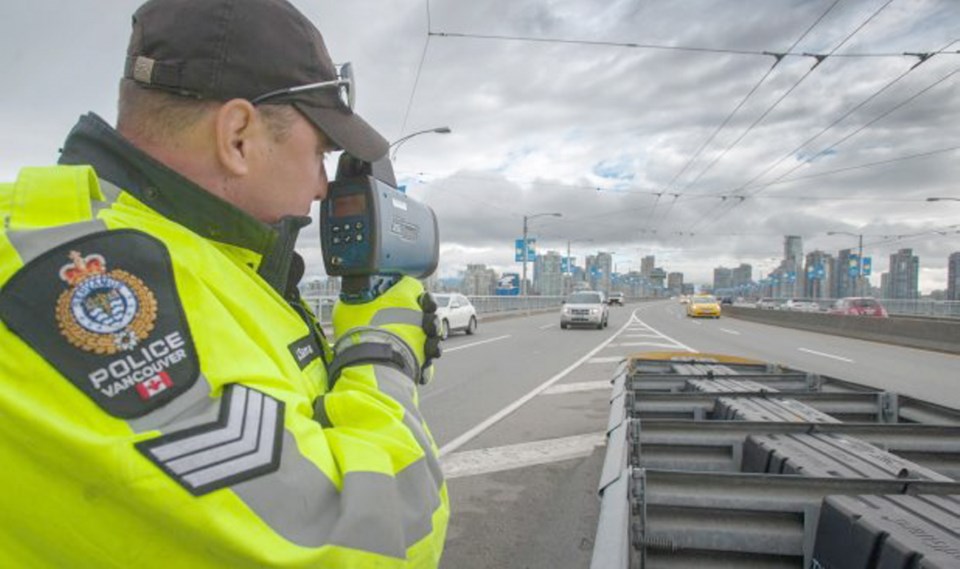Road construction and loss of space to bikes lanes have played a role in the dramatic spike in speeding tickets in Vancouver, according to a veteran traffic cop.
“People are frustrated in the city, with traffic and what’s happening with roads. It’s a common theme the last few years. It’s hard to get around, and when they find an open stretch, they put their foot down to make up time,” according to Sgt. Jack Sarna, a motorcycle cop with Vancouver’s traffic section.
In 2013, Vancouver police issued a record 28,741 speeding tickets, compared to 18,227 the year before.
Sarna said Vancouver police increased speed enforcement work last year to get drivers to slow down, but that alone does not account for the big jump in tickets.
He said enforcement works in the short term — a speeding ticket changes driver behaviour for eight to 12 weeks, but then the old habit returns.
“We need to be constant and consistent. We catch them over and over and then they lose their licence for a while.”
Sarna said police are not going after people driving 10 kms over the speed limit.
“We’re looking for the guys doing 75, 80 and higher. They’re the ones who are going to cause an accident down the road, they’re the dangerous ones,” Sarna said. “We’re going after the speedsters who are putting other people at risk.”
Another factor leading to more speeding on Vancouver streets includes the types of cars being driven.
“You get these kids in their parents’ cars or they’ve leased a vehicle, a Porsche or a Mercedes or a top-end BMW,” Sarna said. “You look inside one of these cars, the speedometers go to 300. These cars are 300 or 400 horsepower, they’re going to put the pedal to the metal, they’re going to drive that car the way it’s made to be driven.”
Which is fine on Germany’s autobahns or on a racetrack.
“It is dangerous, the speed limit in Vancouver is 50 unless otherwise posted,” Sarna said. “It doesn’t matter if you’re on Oak or Marine Drive or Granville, these wide roads. They are not freeways.”
And while Vancouver has recorded a spike in speeding, ridiculous and dangerous driving is occurring across Metro Vancouver.
Last week, a Langley dad was clocked at 101 kilometres over the speed limit with his child in the front seat.
“I don’t know how someone could put a child at risk like that,” said RCMP Cpl. Robert McDonald of the 49-year-old Langley man going 181 km/h on April 19 in a 2005 Ferrari F430 on 176th Street at 32nd Avenue in Surrey.
“What’s more, the driver admitted to police he was aware that very intersection was the scene of a horrific accident where an entire family lost their lives.”
The Langley dad had his Ferrari — which listed upwards of $200,000 when new — impounded for seven days and got a $400 ticket.
Two weeks ago, an Abbotsford dad, with his young daughter in a child seat in the back of the family sedan, was clocked doing almost twice the speed limit in an 80-km/h zone.
“The father was transporting his daughter to a playdate and he was late,” Cpl. Ian MacDonald of the Abbotsford police said. “But not as late as he potentially could have been [had he crashed].”
Here’s some more shocking examples.
The woman who accused the police of targeting her because she was blond — she was driving her Lexus at 144 km/h in a 50 zone.
The six high-performance cars, drivers all under 21, who were recklessly racing by the Sevenoaks mall along South Fraser Way in the middle of Abbotsford.
The parents who berated the police officer for giving their son, a new driver, a ticket for going 72 km/h over the posted limit of 80 and, in the process, impounding the family car.
There are however those who say the safest speed is the speed of traffic, regardless whether it’s faster than the posted limit.
Some U.S. states have more or less used that rationale to increase speed limits on some highways to as much as 85 miles per hour (137 km/h).
“In general, some argue that capable drivers should travel at any speed they want,” said Tarek Sayed, a professor of civil engineering and director of UBC’s bureau of intelligent transportation systems and freight security.
“But there are reasons speed increases the risk of collision,” he said.
Basically, the higher the speed the longer it takes to stop, the less control a driver has over the vehicle and the energy in a moving vehicle is directly related to the square of the vehicle’s speed.
In other words, going from 100 to 120 doesn’t increase your car’s energy by 20 per cent, it increases it by 440 per cent.
Speeding tickets issued in Vancouver
2009: 24,927
2010: 23,353
2011: 21,044
2012: 18,227
2013: 28,741



